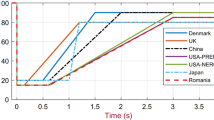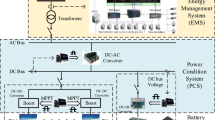Abstract
Adapting the power and energy systems by integrating renewable sources is necessary to address climate change. On the other hand, microgrids are gaining prominence in meeting power and energy requirements, including in remote locations. Consequently, the power system’s penetration of renewable energy-based microgrids is increasing. Planning an isolated microgrid necessitates cost-effective capacity sizing of energy sources and storage systems for maintaining continuity in power supply. Considering the variability and uncertainty of photovoltaic (PV), wind energies, and load variations, deciding the optimal size of renewable-rich, isolated microgrids is challenging. Batteries and fuel cells are potential storage solutions for managing variability. However, a more trustworthy sizing approach is necessary to maximize power availability at the lowest possible cost, even in the face of uncertainty. Moreover, providing the microgrid owner with the opportunity to choose from a range of optimal solutions is also essential. Therefore, incorporating the uncertainty handling feature with the help of robust assessment under worst-case scenarios in the multi-objective optimization method can provide a more trustworthy solution. In this connection, a novel algorithm is proposed that instills robustness in the solutions provided by traditional non-dominated sorting genetic algorithm-II (NSGA-II), which can offer multiple break-even solutions. The isolated microgrids with PV, wind as sources, and storage technologies such as Lithium-ion (Li-ion) batteries, fuel cells, and a combination of both, a less explored scenario, have been compared to determine the effective storage option over the long run while considering uncertainties in renewable energy and load variations. The NSGA-II benchmark solutions developed under these uncertainties and variations are used to validate the robustness of the solutions obtained from the proposed robust algorithm. With a good trade-off between the cost and availability aspects, the proposed algorithm is found to be superior in getting maximum availability with minimum cost under uncertainties.
















Similar content being viewed by others
Data Availability
It will be provided upon request.
References
Nian Y, Liu S, Wu D, Liu J (2013) A method for optimal sizing of standalone hybrid PV/wind/battery system. In: Proceedings of 2nd IET renewable power generation conference, pp 1–4
Lai CS, McCulloch MD (2017) Sizing of stand-alone solar PV and storage system with anaerobic digestion biogas power plants. IEEE Trans Ind Electron 64(3):2112–2121
Xie R, Wei W, Khodayar ME, Wang J, Mei S (2018) Planning fully renewable powered charging stations on highways: a data-driven robust optimization approach. IEEE Trans Transp Electrif 4(3):817–830
Nurunnabi M, Roy NK, Hossain E, Pota HR (2019) Size optimization and sensitivity analysis of hybrid wind/PV micro-grids- a case study for Bangladesh. IEEE Access 7:150120–150140
Mohseni S, Brent AC, Burmester D, Chatterjee A (2019) Stochastic optimal sizing of micro-grids using the moth-flame optimization algorithm. In: Proceedings of IEEE power & energy society general meeting, pp 1–5
Pandey S et al (2021) Multi-criteria decision-making and robust optimization methodology for generator sizing of a microgrid. IEEE Access 9:142264–142275
Mohamed S, Shaaban MF, Ismail M, Serpedin E, Qaraqe KA (2019) An efficient planning algorithm for hybrid remote microgrids. IEEE Trans Sustain Energy 10(1):257–267
Bernal-Agustín JL, López RD, Rivas-Ascaso DM (2006) Design of isolated hybrid systems minimizing costs and pollutant emissions. Renew Energy 31(14):2227–2244
Wang C, Jiao B, Guo L, Yuan K, Sun B (2014) Optimal planning of standalone microgrids incorporating reliability. J Mod Power Syst Clean Energy 2(3):195–205
Xiao J, Bai L, Li F, Liang H, Wang C (2014) Sizing of energy storage and diesel generators in an isolated microgrid using discrete Fourier transform (DFT). IEEE Trans Sustain Energy 5(3):907–916
Neto PBL, Saavedra OR, de Souza Ribeiro LA (2018) A dual-battery storage bank configuration for isolated microgrids based on renewable sources. IEEE Trans Sustain Energy 9(4):1618–1626
Diab AAZ, Sultan HM, Mohamed IS, Kuznetsov ON, Do TD (2019) Application of different optimization algorithms for optimal sizing of PV/wind/diesel/battery storage stand-alone hybrid microgrid. IEEE Access 7:119223–119245
Salman UT, Al-Ismail FS, Khalid M (2020) Optimal sizing of battery energy storage for grid-connected and isolated wind-penetrated microgrid. IEEE Access 8:91129–91138
Dakir S, Boukas I, Lemort V, Cornlusse B (2020) Sizing and operation of an isolated microgrid with building thermal dynamics and cold storage. IEEE Trans Ind Appl 56(5):5375–5384
Liu H, Wang S, Liu G, Zhang J, Wen S (2020) SARAPalgorithm of multiobjective optimal capacity configuration for WT–PV–DE–BES stand-alone the microgrid. IEEE Access 8:126825–126838
El Boujdaini L, Mezrhab A, Moussaoui MA et al (2022) Sizing of a stand-alone PV-wind-battery-diesel hybrid energy system and optimal combination using a particle swarm optimization algorithm. Electr Eng 104:3339–3359. https://doi.org/10.1007/s00202-022-01529-0
Swaminathan S, Pavlak GS, Freihaut J (2020) Sizing and dispatch of an islanded microgrid with energy flexible buildings. Appl Energy 276:115355
Khorramdel H, Aghaei J, Khorramdel B, Siano P (2016) Optimal battery sizing in microgrids using probabilistic unit commitment. IEEE Trans Ind Inform 12(2):834–843
Liu P, Cai Z, Xie P, Li X, Zhang Y (2019) A decomposition-coordination planning method for flexible generation resources in isolated microgrids. IEEE Access 7:76720–76730
Cen B, Cai Z, Liu P, Chen Y (2020) Penalty adjustment-based sizing method for flexible resources in isolated microgrids. IEEE Access 8:228619–228627
Alharbi H, Bhattacharya K (2018) Stochastic optimal planning of battery energy storage systems for isolated microgrids. IEEE Trans Sustain Energy 9(1):211–227
Fioriti D, Lutzemberger G, Poli D, Duenas-Martinez P, Micangeli A (2021) Coupling economic multi-objective optimization and multiple design options: a business-oriented approach to size an off-grid hybrid microgrid. Int J Electr Power Energy Syst 127:106686
Krishna PVNM, Sekhar PC, Ali MD (2020) Optimal planning of hybrid microgrid-a validation. In: 2020 20th international conference on sciences and techniques of automatic control and computer engineering (STA), Monastir, Tunisia, 2020, pp 255-260. https://doi.org/10.1109/STA50679.2020.9329323
Ban M, Guo D, Yu J, Shahidehpour M (2019) Optimal sizing of PV and battery-based energy storage in an off-grid nano grid supplying batteries to a battery swapping station. J Mod Power Syst Clean Energy 7(2):309–320
Zeng Bo, Zhao Long (2013) Solving two-stage robust optimization problems using a column-and-constraint generation method. Oper Res Lett 41(5):457–461
Hesaroor Kashinath, Das Debapriya (2019) Optimal sizing of the energy storage system in islanded microgrid using the incremental cost approach. J Energy Storage 24:100768
Tahir KA, Zamorano M, García JO (2023) Scientific mapping of optimization applied to microgrids integrated with renewable energy systems. Int J Electr Power Energy Syst 145:108698. https://doi.org/10.1016/j.ijepes.2022.108698
Abomazid AM, El-Taweel NA, Farag HEZ (2022) Optimal energy management of hydrogen energy facility using integrated battery energy storage and solar photovoltaic systems. IEEE Trans Sustain Energy 13(3):1457–1468. https://doi.org/10.1109/TSTE.2022.3161891
Borhanazad H, Mekhilef S, Ganapathy VG, Delshad MM, Mirtaheri A (2014) Optimization of the microgrid system using MOPSO. Renew Energy 71:295–306
Chen Z, Li Z, Chen G (2023) Optimal configuration and operation for user-side energy storage considering lithium-ion battery degradation. Int J Electr Power Energy Syst 145:108621
Qadrdan M, Jenkins N, Wu J (2018) Chapter II-3-D-smart grid and energy storage. In: Ths S (ed) McEvoys handbook of photovoltaics, 3rd edn. Academic Press, pp 915–928. https://doi.org/10.1016/B978-0-12-809921-6.00025-2
Zia MF, Elbouchikhi E, Benbouzid M (2019) Optimal operational planning of scalable DC microgrid with demand response, islanding, and battery degradation cost considerations. Appl Energy 237:695–707. https://doi.org/10.1016/j.apenergy.2019.01.040
https://www.nrel.gov/docs/fy23osti/85878.pdf
Deb K, Pratab A, Agrawal S, Meyarivan T (2002) A fast and elitist multiobjective genetic algorithm: NSGA-II. IEEE Trans Evol Comput 6(2):182–197
Zitzler E, Laumanns M, Thiele L (2001) SPEA2: improving the strength Pareto evolutionary algorithm. Dept. Elect. Eng., Swiss Federal Inst. Technol., Zürich, Switzerland, Rep. TIK-Report103
Andreas A, Stoffel T (1981) NREL Solar Radiation Research Laboratory (SRRL): Baseline Measurement System (BMS). Golden, Colorado (Data); NREL Report No. DA-5500-56488. https://doi.org/10.5439/1052221
Aien M, Hajebrahimi A, Fotuhi-Firuzabad M (2016) A comprehensive review on uncertainty modeling techniques in power system studies. Renew Sustain Energy Rev 57:1077–1089
Muqbel AT, Al-Awami M. Parvania (2022) Optimal planning of distributed battery energy storage systems in unbalanced distribution networks. IEEE Syst J 16(1):1194–1205. https://doi.org/10.1109/JSYST.2021.3099439
Funding
This research work is supported in part by Science and Engineering Research Board, Department of Science and Technology, Government of India, through its research grant ECR/2015/000310
Author information
Authors and Affiliations
Contributions
PVNMK did conceptualization, implementations, and result analysis and wrote and reviewed the manuscript. PCS contributed to developing concepts, critically analyzing results, and reviewing the manuscript. TRB did implementations and contributed to the write-up of the manuscript.
Corresponding author
Ethics declarations
Conflict of interest
The authors of this manuscript have no conflict of interest.
Ethical approval
Not applicable.
Additional information
Publisher's Note
Springer Nature remains neutral with regard to jurisdictional claims in published maps and institutional affiliations.
Rights and permissions
Springer Nature or its licensor (e.g. a society or other partner) holds exclusive rights to this article under a publishing agreement with the author(s) or other rightsholder(s); author self-archiving of the accepted manuscript version of this article is solely governed by the terms of such publishing agreement and applicable law.
About this article
Cite this article
Krishna, P.V.N.M., Sekhar, P.C. & Behera, T.R. A robust optimal sizing of renewable-rich multi-source microgrid under uncertainties with multi-storage options. Electr Eng (2024). https://doi.org/10.1007/s00202-024-02331-w
Received:
Accepted:
Published:
DOI: https://doi.org/10.1007/s00202-024-02331-w




